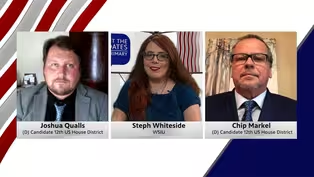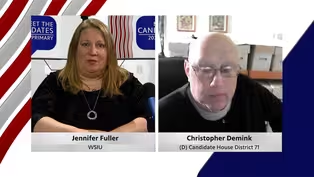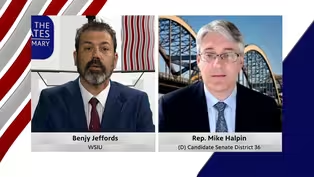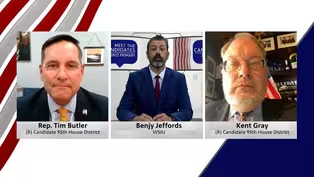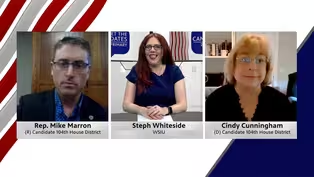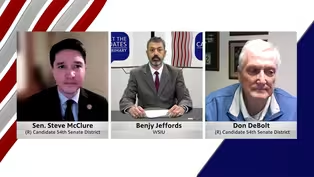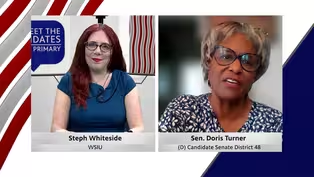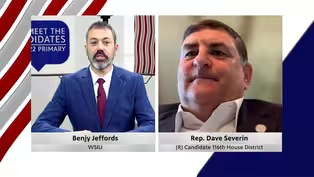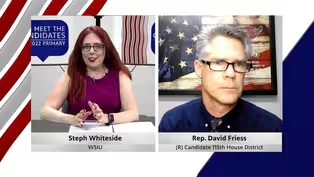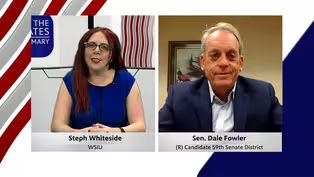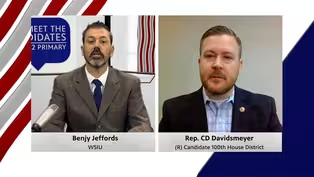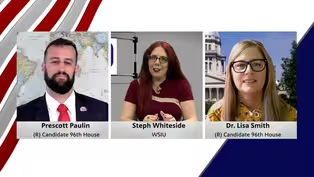Meet the Candidates
114th Illinois House District Primary Candidate Forum
6/17/2022 | 25m 57sVideo has Closed Captions
Dr. Kevin Schmidt and Kevin Dawson, running for the 114th House District.
Ahead of the June primary, WSIU sat down with Dr. Kevin Schmidt and Kevin Dawson, running for the 114th House District.
Problems playing video? | Closed Captioning Feedback
Problems playing video? | Closed Captioning Feedback
Meet the Candidates is a local public television program presented by WSIU
This series is produced in partnership with the League of Women Voters
Meet the Candidates
114th Illinois House District Primary Candidate Forum
6/17/2022 | 25m 57sVideo has Closed Captions
Ahead of the June primary, WSIU sat down with Dr. Kevin Schmidt and Kevin Dawson, running for the 114th House District.
Problems playing video? | Closed Captioning Feedback
How to Watch Meet the Candidates
Meet the Candidates is available to stream on pbs.org and the free PBS App, available on iPhone, Apple TV, Android TV, Android smartphones, Amazon Fire TV, Amazon Fire Tablet, Roku, Samsung Smart TV, and Vizio.
Providing Support for PBS.org
Learn Moreabout PBS online sponsorshipMore from This Collection
Meet the Candidates features interviews with candidates running for Illinois state, House and Senate races. Guests will discuss key issues impacting Illinois voters such as the economy, the environment, education and public health. This series is produced in partnership with the League of Women Voters.
12th U.S. Congressional Seat Primary Candidate Forum
Video has Closed Captions
Joshua Qualls and Chip Markel, running for the 12th U.S. Congressional Seat. (25m 21s)
71st House District Primary Candidate
Video has Closed Captions
Ahead of the June primary, WSIU talked with Christopher Demink, running for the 71st House (21m 35s)
36th Senate District Primary Candidate Forum
Video has Closed Captions
WSIU talked with 36th Senate District candidate Representative Mike Halpin. (26m 29s)
95th Illinois House District Primary Republican Candidates
Video has Closed Captions
Representative Tim Butler and Kent Gray, running for the 95th House District. (26m 58s)
104th Illinois House District Primary Candidates
Video has Closed Captions
104th House District candidates Representative (R) Mike Marron and (D) Cindy Cunningham. (26m 49s)
54th Illinois Senate District Primary Republican Candidates
Video has Closed Captions
54th Illinois Senate District Primary Republican Candidates forum. (25m)
48th Illinois Senate District Primary Democrat Candidates
Video has Closed Captions
48th Illinois Senate District Primary Democrat Candidates forum. (26m 46s)
116th Illinois House District Primary Republican Candidates
Video has Closed Captions
116th Illinois House District Primary Republican Candidates forum. (25m 9s)
115th Illinois House District Primary Republican Candidates
Video has Closed Captions
115th Illinois House District Primary Republican Candidates forum. (23m 14s)
59th Illinois Senate District Primary Republican Candidate
Video has Closed Captions
WSIU interviews Senator Dale Fowler from the 59th Senate District. (27m 29s)
100th Illinois House District Primary Republican Candidates
Video has Closed Captions
WSIU interviews candidate C.D. Davidsmeyer, running for the 100th House seat. (26m 9s)
96th Illinois House District Primary Republican Candidates
Video has Closed Captions
Candidates Prescott Paulin and Dr. Lisa Smith, running for the 96th House seat. (28m 45s)
Providing Support for PBS.org
Learn Moreabout PBS online sponsorship(upbeat music) (camera clicking) (dramatic music) - This is "Meet the Candidates" with primary candidates for the 114th House District.
I'm Benjy Jeffords, WSIU Public Broadcasting and the League of Women Voters are pleased to host today's forum.
The rules are simple.
Each candidate will have 60 seconds to answer the question and should not mention their opponent in their response.
Join us today are Dr. Kevin Schmidt and Kevin Dawson, both running for the Republican spot on the ballot.
We'll start with you, Dr. Schmidt.
What is your number one priority if elected?
I know it can be hard to narrow it down to one, but please, let's try to stick to one.
- Well, I'd like to say thank you for having us here.
It's important to have informed voters.
And my number one issue is taxes.
I think we need to lower them to retain voters, retain residents, retain businesses.
That's creating a lot of overhead for the businesses and pushing people out.
So my number one issue would be taxes to create job creation and job growth and retain residents.
- And Mr. Dawson, same question to you.
- Yeah, thank you again and I'd like to say the same.
Thank you to the League of Women Voters, WSIU and PBS that you're on for broadcasting this and having us here today.
My concern is really more of enveloping concern about repeatingly bad policy coming out of Springfield, that does include budget concerns and taxation, but it also includes crime.
And so what we're seeing is that the cycle that the Illinois' General Assembly's put us on with regard to people leaving.
People are leaving the State of Illinois and when they leave, we lose their tax dollars, we lose their revenue.
We lose the money that we need to fund the budgets.
And when people leave, the schools suffer and when schools suffer, crime increases.
And when crime increases, more people leave and here we are back on the same cycle again.
So my concern would be, or my priorities would be things to reduce obviously taxation, but also to address the crime situation.
- Thank you for that response.
And Mr. Dawson, we'll start with you this time.
What would make you an effective lawmaker if elected?
- Well, I think what would make me an effective lawmaker is that I've been a county board member representing the interest of the people of Mascoutah, where I'm from, for the last six years.
And with that comes a little bit of experience and knowledge in terms of how policy making works.
I'm an attorney.
I work with the law every single day.
I'm the only candidate in this race that has the fundamental knowledge of the law to be able to work with the other members of the General Assembly to pass good policy because that's what's not being addressed right now, we need more of that.
I'll be there and I'll be responsive to the constituents.
That's the main concern in the 114th district right now, and I'll be there and I'll be responsive to the constituents.
- And thank you.
And Dr. Schmidt, same question to you.
- Well, I think we need a balance of representatives in there.
I come from the healthcare industry and I think we definitely know since the pandemic that we need to address health concerns.
And we need a balance of legislators in there.
There are plenty of attorneys in there already.
I'm an innovator.
I'm a problem solver.
I'm a deal maker and I think that's what we need in there, a good balance of legislators.
- Thank you.
And for the next question, we'll start with you, Dr. Schmidt.
The pandemic really exposed disparities in education funding.
What would you do to make sure schools in your district are able to meet the needs of the families and the students?
- Well, so I would definitely increase funding for education across the state, but I am in favor of school choice, which would give lower income families the choice to send their children to schools where the middle class and rich kids are attending.
Because I think that that would actually level the playing field at least a little bit more for them.
- Thank you.
And same question to you, Mr. Dawson.
- Yeah and I think as far as we're talking about education funding, where is the lottery money?
Where's the gambling money that Illinois schools were promised all this time?
Where's the COVID relief money?
We need more transparency in the budget process to find out where this money is if it's not being used to fund education the way it should be.
Obviously, local property taxes fund roughly two thirds of school districts, that does cause a disparity.
Also causes a disparity with certain exemptions being applied.
And so what I would like to do is address the situation in a way that we can allocate the property tax base throughout the entire state instead of having over-impacted local school districts.
- Thank you.
And we'll start with you again, Mr. Dawson.
The state budget is a major priority in Springfield.
Name three things you would prioritize.
- Yeah, so back in 2016, when I was first elected to the county board, the Illinois budget was $32 billion.
A couple of months ago, the Illinois General Assembly and the governor signed in a law of budget of $48.6 billion.
We don't have a revenue problem right now in the state of Illinois, what we have is a spending problem.
But what I think the three budget concerns need to be is exactly what I've been talking about so far in these questions with education, crime.
That the hilariously ironically-named Safety Act crime reform bill from last year was a complete disaster.
And I wanna work on day one with a group to try to repeal that crime reform bill, because that, that has literally taken the handcuffs off of the criminals and put 'em on the police.
And that's why the I'm the only candidate in this race that was endorsed by the General Order of Police, because I have the fundamental knowledge and I have the experience being a member of the police commission here in Mascoutah that works with law enforcement.
- Thank you.
And Dr. Schmidt, what are the three things you would prioritize in the budget?
- Well, I would start with education because that's the future of the State of Illinois.
It's the future of the nation.
We need to have high quality education available to everyone.
Second, I would increase funding for infrastructure because the businesses and the people need to be able to move around the state freely.
Roads, bridges, those need to be worked on.
And, of course, crime.
We need to increase funding for the police force, increase funding for prosecutors to keep criminals off the streets.
And those would be my three priorities.
- Thank you.
And Dr. Schmidt, what would be three things you would cut from the budget?
- Okay, so I would start with the red tape that many of the businesses have to face.
Especially starting a new business, it can take quite some time and businesses just won't go here, they'll go somewhere else.
I would cut all of the cronyism where companies and people are getting hired just because they know somebody.
That's costing us a lot because they're not qualified.
And the third thing I would cut is it would have to do with all the layers of government.
There's just too many layers of government and they're repeating themselves where one layer of government's doing the exact same thing as another layer of government or another program.
So I'd consolidate and streamline the system so that it would save money for the taxpayers.
- Thank you.
And Mr. Dawson, what would be three things you would cut from the budget?
- Well, this comes straight out of the department of redundancy department.
We've got so many duplicative programs in the State of Illinois.
Those need to be analyzed.
I'm not necessarily talking about layers of government like Mr. Schmidt is.
I think locally here in St. Clair County, particularly in Mascoutah and Engelmann Township where I'm from, if the townships were eliminated, no road would ever get fixed again if it had to rely on county services.
So townships, to me, are very important and I think that eliminating a layer of government within local control would be disastrous.
One thing we could eliminate is the expanded Medicaid for illegal immigrants.
I don't understand why this is a priority of this administration, but that needs to be ended.
That would be a good budget-saving technique.
Taxpayer-funded abortions, taxpayer-funded abortion clinics, those things need to be eliminated from the budget to make up that deficit for any lost revenue because people are moving.
- Thank you.
And we'll start again with you, Mr. Dawson, and we're gonna move on to some more recent events.
Although the economy is recovering from the early stages of the pandemic, inflation is also on the rise.
What would you do to help Illinoisans who are finding their paychecks don't stretch as far as they did even a couple of months ago?
- Yeah, I mean, I hear it every day.
Whether it's clients, friends, family, people, constituents from on my county board district, people are paying at the pumps.
They're paying an extra tax on top of the motor fuel tax.
Obviously, we need the motor fuel tax because that's gonna go to fund the infrastructure that we need, but there's an extra tax on top of the motor fuel tax and that's a predatory taxation that the citizens of Illinois are being burdened with.
The grocery tax.
Everybody's been talking about the grocery tax recently.
It's not just a recent thing, but what we need, we need people there that are going to address the situation and find permanent tax relief to not only property tax, but the gas tax and the grocery tax, not just politically-motivated, temporary cessations of these taxes that come around every election year.
- Thank you, Mr. Dawson.
And Dr. Schmidt, same question to you.
- Yes, so once again, tax relief.
I would look at all of the taxes across the board, there's too many to name.
That will put more money in people's pockets, that will definitely help with inflation as far as at the state level.
So tax reduction, look at all the taxes across the board, eliminate as much as we can.
- Thank you.
And we'll start again with you, Dr. Schmidt.
People are pushing for more renewable energy, especially with the rising price of oil.
At the same time, parts of Illinois have fossil fuel supplies that could provide energy for many years to come.
What would you do to ensure Illinois has a steady supply of energy and keep it affordable for Illinoisans?
- Well, so I would look at all options, but at this point, I would continue to burn coal and I would continue to use our fossil fuels.
The other sources of energy out there are not as dependable yet.
Maybe one day they will be, but at this point to keep costs down and keep things efficient and dependable, I would continue to do what we're doing and it's burning coal.
- Thank you.
And Mr. Dawson, same question to you.
- Generally speaking, I would agree, we can't abandon coal.
The kill the coal experiment has clearly not worked.
I've sat down and I've talked to those plant managers and I've talked to the people that work in those plants locally here.
Some of them are friends of mine and they're losing their jobs and you know what?
They're taking their families and their families' tax dollars out.
But we do need to explore diversification of energy in order to create a sustainable energy for the future of Illinois.
Those plant managers that I've talked to?
They're predicting nearly doomsday predictions, catastrophic problems with the renewable energy and with the energy sources in the State of Illinois and that needs to be addressed.
- Thank you.
And we'll start again with you, Mr. Dawson.
COVID-19 changed the way people looked at healthcare and public health.
What would you do to make sure Illinois is prepared to handle future public health emergencies?
- Well, I think the number one thing would be to work to change the Emergency Management Act so that we don't have a governor that can unilaterally decide which businesses stay open and which businesses have to close.
The fact that that was allowed to happen in perpetual 30-day extensions of the disaster declaration is something that cannot possibly happen, that needs to be addressed and it needs to be addressed soon.
That's the main thing.
I do wanna thank the healthcare workers that were fighting on the front lines of the COVID-19 pandemic.
But the number one thing that we can do about that is to maintain that local control to decide what is a problem locally and what is not.
We can't have some governor sitting in Springfield that's shutting down businesses perpetually and causing problems with unemployment.
We found out during that that IDES is a complete disaster, that needs to be looked at.
So those things would help.
- Thank you.
And Dr. Schmidt, same question to you.
- Yes, I agree a hundred percent with limiting the government's power, especially the governor's power, but not just, the government's power, as well.
These things need to be voted on, you can't just shoot from the hip and shut people down.
I also think we need state legislators that are healthcare providers like myself, so that we can properly interpret the information from all of the different experts and make informed decisions and not overreact or underreact.
I have knowledge in that field and I think we need more people in there with knowledge in that field.
- Thank you.
And we'll start again with you, Dr. Schmidt.
Gun violence continues to be a problem for communities across the state.
What would you do to address the violence and how do you balance that with Second Amendment rights?
- Well, so the Second Amendment is a fundamental right.
Every human being has a right to protect themselves, it's just as simple as that.
And I think we need to look at who's pulling the trigger.
So the gun itself is not violent, someone has to pull the trigger.
And I would look at mental health.
We check people's teeth out on a regular basis and make sure that their teeth are functioning fine.
We do that with children.
I think we should do the same thing with mental health and stop problems before they get outta hand.
So I would look into mental health and actually increase funding for it.
The brain is the most important part of the body and it is overlooked and we are paying for it.
- Thank you.
And Mr. Dawson, same question to you.
- I too am a full supporter of the Second Amendment; I'm a hundred percent for legal gun ownership.
What we know from statistics is that law-abiding citizens do not commit crimes, otherwise they'd be criminals.
But to me, it's more of a systemic issue when we talk about violent crime, particularly as it relates to guns, because what we know we have is one, we've got a horrible crime reform bill that is allowing and perpetuating the cycle of criminals getting back out the streets.
The recidivism rate is through the roof.
It's going to be through the roof because those criminals are getting back on the streets.
We have prosecutorial indifference.
We have state attorneys that decide not to prosecute violent crime the way they should.
We have judicial liberalization.
We have judges that are letting criminals walk.
I'm the only candidate in this race that's not only endorsed by the Fraternal Order of Police, but also the Illinois State Rifle Association and there's a reason for that.
- Thank you.
And we'll start again with you, Mr. Dawson.
Criminal justice reform is a hot topic in Springfield.
Do you support changes to the system, including alternative sentence, sentencing options, like drug courts?
What changes would you make to ensure safety while also making sure rehabilitation remains an option?
- Benjy, no truer words have been spoken that the criminal justice situation in Illinois completely needs to be reformed.
I think I've touched on that several times.
That and the Safety Act.
I don't even like calling it the Safety Act because frankly, it's just not.
The crime reform bill that was signed in last year needs to be repealed and it needs to be repealed soon.
But the real issue here that we're talking about is non-violent crimes.
I'm completely fine with ancillary courts.
And as I said, as an attorney, I've practiced all over the State of Illinois.
Those ancillary courts: veteran's court, drug court, juvenile court, those are good programs and they need to be maintained, but not for violent criminals.
The violent criminals need to be addressed through the court system, through the criminal justice reform system after we can repeal the crime reform bill.
- Thank you.
And Dr. Schmidt, same question to you.
- Yes, I think we should separate violent crime from non-violent crime.
Violent crime, we need to ratchet things up on increased funding, keep criminals behind bars.
But non-violent crime, once again, I think we need to go back to mental health.
I think we need to go back to why are these individuals addicted to the drugs and get to the root cause.
Because if we don't get to the root cause, the problem's just gonna continue and get worse.
- Thank you.
And we'll start again with you.
Dr. Schmidt.
Recent events have shown how much Americans can be impacted by global politics as evidenced by supply chain shortages and rising prices due to the pandemic and fighting in the Ukraine.
What would you do to try to help minimize the disruption of events like these on the people of Illinois?
- Well, we need to encourage companies to produce things in the United States of America and in the State of Illinois.
That would definitely solve the supply chain problem because we would be making the supplies right here.
And that is done through less taxation and less regulation and making things profitable for businesses.
- Thank you.
And Mr. Dawson, same question to you.
- Yeah, I've got a lot of clients that are farmers.
Our practice is big in the agribusiness industry.
I talk to these farmers every day about exportation and what that means for their business and they're constantly trying to evolve.
Diversification would be something that, the diversification of the products and the industry that Illinois is involved in.
We do need to be more self-sufficient so that we don't have issues where we're relying on foreign matters to supply us with what we need.
I think we need to work closely.
The Illinois legislature and the executive branch of Illinois need to work closely with our federally-elected officials like Congressman Bost and Congresswoman Mary Miller.
We need to work with those individuals so that the channel of communication between the federal government and the state government is a more fluid, concise operation.
- Thank you.
And we'll start again with you, Mr. Dawson.
What would you do to make sure the concerns of your constituents are heard in Springfield considering the population density skews toward the Northern part of the state?
- Well, the number one thing would be to be there.
If this race shows nothing, it shows that we need to elect the right people in the 114th representative district.
We need people that are going to be there.
We need people that have a fundamental knowledge of not only law, but policy making and how the legislature works.
We need people that are going to respond to the needs of not only our inner cities, but also the rural areas.
We need to take those issues and have a representative, a cohesive representative voice that will be heard in Springfield and try to make real change for the people of Southern Illinois and the entire state.
- Thank you.
And Dr. Schmidt, same question for you.
- Yes, I definitely think we need to have someone that's gonna be there.
And I think the key to bridging the gap is to make relationships with the legislators up north and longstanding relationships and a little bit of give and take.
And ultimately, that's how our voice will be heard down here.
- Thank you.
And we'll start again with you, Dr. Schmidt.
What would you do to help ensure fair elections and access to voting for all people in Illinois?
- Well, I think we need to introduce voter ID laws and as far as access, I really think everyone does have access to voting.
- Thank you.
And Mr. Dawson, same question for you.
- Yes, I don't see an issue with access to voting.
Clearly, we need more voter integrity units on a local level.
We have one here in St. Clair County.
I think that probably needs to be expanded into other counties, as well, so that they can determine whether addresses match petitions, whether addresses match the vote-by-mail applications.
Those problems, anytime you introduce another layer of the procedure in terms of voting.
So you have your ballots and then you drop 'em in a mailbox and maybe they show up or they're brought.
We need checks and balances if the vote-by-mail process is going to stay in place, which I think we could, reasonable people could argue whether it needs to or not.
But I don't have an issue with the access to the ballot, but I think the vote-by-mail situation causes some particular problems, or at least theoretical problems anyway, with voter integrity and that needs to be addressed on a local level.
- Thank you.
And we'll start again with you, Mr. Dawson.
Internet access is becoming increasingly necessary for people to work and go to school.
What would you do to make sure rural areas can access the high-speed internet they need?
- Well, it's kind of what we've been talking about already in terms of what can we do in order to make sure the infrastructure needs are met?
The biggest thing that we can do is keep people in Illinois because once those tax dollars leave, we may lose the money for investment and by local companies.
whether it's a high-speed cable company or a telephone company, or a cell phone company, those companies don't wanna be in Illinois anymore and so they're leaving.
We need to do a better job of keeping people here so that we can provide a good business environment, a good business climate, so those companies will invest and they will come in and bore out their internet line into the rural areas to make sure access is available for people in this day and age.
Because you're right, it is becoming an issue.
But I think the bigger issue is maintaining business in Illinois is going to be difficult going forward if Illinois stays on the track it's on.
- Thank you, Mr. Dawson.
And Dr. Schmidt, same question to you.
- I would increase tax incentives for the telecommunication company so that they'll put the lines in.
It's just that simple.
If they can make it a profitable situation, they'll do it.
- Thank you.
And we'll start again with you, Dr. Schmidt.
COVID-19 has depleted the state's unemployment fund.
What would you do to address this?
- Well, I would put people back to work.
Ultimately, that's what needs to be done and that's done through making this state tax friendly for businesses.
- Thank you.
And Mr. Dawson, same question for you.
- Clearly, we need people back to work and we need to eliminate the incentives for not working.
Again, it brings me back to the point of the one-person dictatorship during the COVID-19 pandemic snapping his fingers and making decisions up north and forcing everyone else to play by his rules, whether or not it affected certain areas equally or not.
That's a big problem and I alluded to it before.
What happened is exactly what this question is tailored to is that IDES is running out of funds.
Well, when you subsidize people sitting around and not working and then force their industry to shut down and they can't go back to work, no wonder that's going to happen.
So ultimately, people need to go back to work and we need to subsidize that program the right way.
- Thank you, and we have just enough time for one more question and we'll start with you, Mr. Dawson.
Illinois has some of the highest property taxes in the country.
What would you do to provide relief to homeowners?
- Yeah, that's a big one.
I mean, it's property tax, payroll tax, the gas tax, grocery tax.
I mean, we are being taxed to death in the State of Illinois.
The property tax situation in Illinois is a little different because we have certain exemptions that don't apply equally throughout the entire state.
One thing and I alluded to it before.
One thing I think we could do, we need to look into how to allocate that property tax burden throughout the entire state.
The exemptions that cause a local focus and where, like particularly here in St. Clair County.
St. Clair County feels the burden of the property tax relief or the property tax problem more so than other counties because of its specific situation and the demographics.
Those things need to be addressed because quite honestly, it's a state law, not a county law.
It's a state law that applies those exemptions.
It needs to be addressed and figure out how we can allocate that tax burden all the way through the entire state.
That would be a big step in giving the taxpayers some property tax relief.
- Thank you.
And Dr. Schmidt, same question for you.
- So if you look at your tax bill and all the different layers on there, which I've spoken before, the different layers of government, I wouldn't be eliminating any layer or eliminating possibly any jobs, but we would consolidate and streamline, put things under one house.
And ultimately, that would save quite a bit of money.
There's just so many different taxing bodies on there.
I think consolidation is the key.
Like I said, keep the same amount of workers because we need the work to be done, but we don't need as many chiefs.
Not as many chiefs, just as many workers.
- Thank you.
And thank you all so much for joining us.
And thank you for tuning in for "Meet the Candidates" for House District 114 Republican candidates, Kevin Dawson and Dr. Kevin Schmidt For WSIU, I'm Benjy Jeffords.
(dramatic music)

- News and Public Affairs

Top journalists deliver compelling original analysis of the hour's headlines.

- News and Public Affairs

FRONTLINE is investigative journalism that questions, explains and changes our world.












Support for PBS provided by:
Meet the Candidates is a local public television program presented by WSIU
This series is produced in partnership with the League of Women Voters

